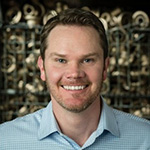From Kindergarten Cleanup to Corporate Sustainability
Patrick Boyle's journey to water stewardship leadership and the MSES classroom began with his son’s own care for the Earth.
Walking home from school on a sunny afternoon 15 years ago with his kindergarten-aged son, Patrick Boyle watched in surprise as the boy suddenly darted away, eagerly picking up litter from the bushes.
When asked why, the child's simple response became a catalyst for Boyle's career: “Dad, I'm trying to save the Earth.”
It was a proud “like father, like son” moment, and one Boyle frequently reflects on as he teaches graduate students who are the same age as his son is now.
An (80 gallon) Cup of Coffee
Today, Boyle is the director of sustainability at a global food and beverage distribution company. Boyle oversees the sustainable operation of more than 250 facilities across North America.
the sustainable operation of more than 250 facilities across North America.
He's also an adjunct professor who teaches Sustainability in Water and Wastewater in Northwestern's Master of Science in Energy and Sustainability (MSES) program. Northwestern Engineering and the Paula M. Trienens Institute for Sustainability and Energy jointly offer MSES.
During his five-week MSES course, Boyle aims to open students' eyes to the often-overlooked importance of water in our daily lives and business operations. He introduces sometimes startling facts that highlight the hidden water costs in everyday items.
“A sheet of paper takes two-and-a half-gallons of water to make,” Boyle said. “Your cup of coffee in the morning? It takes about 80 gallons of water to produce.”
He combats those facts with startling statistics about water scarcity. According to UNICEF:
- Almost two-thirds of the world’s population experiences severe water scarcity at least one month per year.
- More than two billion people live in countries with an inadequate water supply.
- By 2040, approximately 1 in 4 children will live in areas of extremely high water stress.
An Engaging Pedagogy
Rather than lecture for hours, Boyle guides students through research and discussions about water stewardship topics. He also brings in industry experts to provide relevant perspectives.
“I want the students engaged,” he said. “I want them doing research. I want us talking and working together.”
The course covers a broad range of water-related issues, from scarcity and quality to environmental pollutants. Boyle leverages Northwestern’s proximity to the Great Lakes to discuss local water management strategies, including stormwater control, green infrastructure initiatives, and emerging technologies.
He then contrasts those with challenges faced in other regions of the world, providing students with a global perspective on water issues.
Boyle’s industry experience – which includes working with major food and beverage companies such as Coca-Cola, McDonald's, and Chipotle – provides valuable insights for his students. He emphasizes the importance of understanding corporate water impacts, from consumption to discharge, and the responsibility companies have to manage these effects.
The course culminates in a final paper where students can explore any water-related topic that interests them.
“I’ve seen some really heartfelt papers based on some topics that were really close to their heart,” said Boyle, who is in his fifth year teaching at Northwestern. “It is fun seeing students get passionate about something they didn’t know they were passionate about.”
A Grounded Perspective
As the global water crisis intensifies, Boyle’s work in the corporate world and in the classroom is taking on increasing significance. He is preparing the next generation of sustainability professionals to tackle complex water issues across various sectors, from manufacturing to policy-making.
Boyle said this entire journey might never have started without the care his own son, who recently turned 20, showed for the Earth as a small boy. Because of that, he remains open to learning from those in his classroom.
“It seems every year I learn something from a student that I'll pull into my next course,” he said. “We need water to make energy. We need water to make food. You need food to make water and energy. It is all interrelated.”